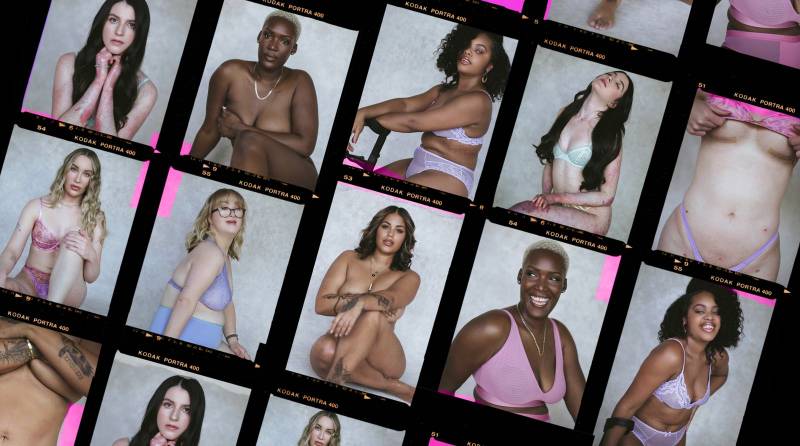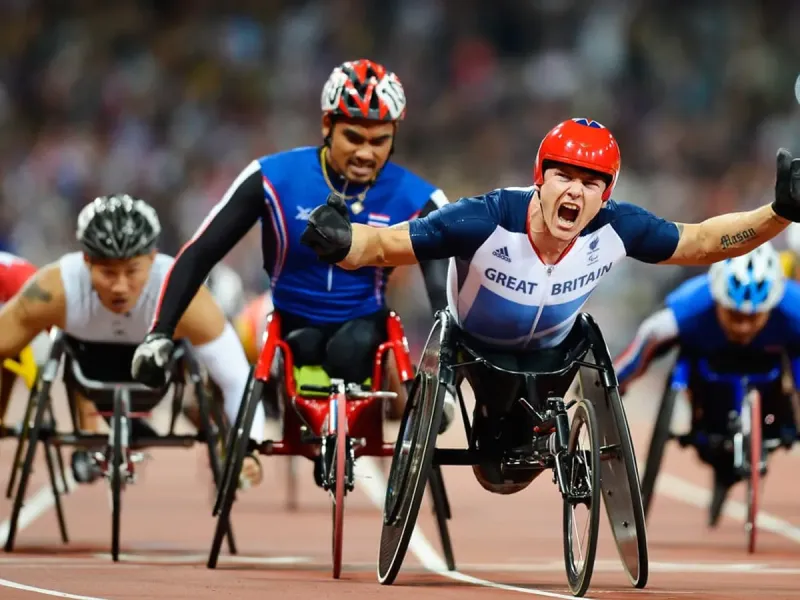How we feel about our bodies is constantly evolving. Here, Malin Andersson is joined by five other incredible women to discuss body image and how their individual journeys have impacted what they see in the mirror
What do you see when you look at yourself? Do you pick your image apart? Wish you could – with a swipe of your finger – smooth your skin, erase or add a curve? We live in a world of online optical illusions, so it’s easy to compare ourselves with a filter. Or maybe there are precious days you think, ‘I look good!’ The body confidence movement has, thankfully, made us aware of the myths we’re sold and championed the tremendous power of self-love.
But the truth is, loving yourself isn’t always easy, and how you feel about your body will change. Month by month, day by day, hour by hour. We all go through journeys with our bodies. Childbirth and operations. We age. We lose weight, we gain it. How we look on the outside can be the exact opposite of how we feel on the inside, with our mental health and happiness playing a huge part in our body image. It’s an internal tug of war, one exacerbated by the conflicting #hotgirlsummer and #loveyourself messaging we’re bombarded with, particularly during the summer.
So here is our antidote. It’s not a lecture. It won’t tell you to gain weight, lose weight, love your flaws-that-aren’t-flaws. It’s an honest conversation about the evolution of our body image, and a reminder that however you’re feeling about your body today – that’s okay. You’re not alone on your journey, and these six women are proof.
Malin Andersson
Before Malin, 29, appeared on season two of Love Island, she worked as an air hostess. Now she’s a body positivity advocate and the author of Positivity Is Our Superpower. In January she gave birth to baby Xaya, who was born through the same C-section scar that Malin’s first daughter, Consy, was in December 2018. Consy was born seven weeks premature and tragically died less than a month later. Both pregnancies changed Malin’s relationship with her body and allowed her to let go of years of self-hate.
Hairy vulva. Saggy stomach. Standing in the bathroom, naked and bleeding, my knickers around my ankles. My C-section scar pinching at my stomach. My partner bends down to change my pad for me. But I feel no shame.
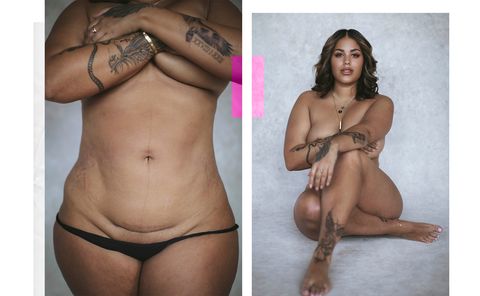
.
This version of me is a world away from who I used to be, especially on Love Island. I feel sad for her. I look back at photos and she looks dead behind the eyes. It’s incredible how much history sits in our camera rolls. All these old versions of myself. I used to pick myself apart, examine each part of me with a desire to change it. When I was a child, my mum called me chubby, put pressure on me to diet – it stuck. During my teens, I lost myself. Bulimia meant I was stuck in a cycle of binge eating and purging. I remember wondering if the number on the scales would consume me forever. When I was cabin crew, I even packed scales in my suitcase. I’d take naked photos, posing to make myself look skinnier, sucking in my stomach.
When I got out of the villa, I was viciously trolled. I was called the ‘fat one’. I was already insecure, so when I was offered free cosmetic surgery, I took it. I thought it would make me happier, but my mind wasn’t healed by my fat being sucked away. I’d never tell anyone not to get surgery, but it didn’t change how I felt on the inside. Being pregnant with Consy changed everything. When you see your baby, their eyes staring back at you, everything else falls into irrelevance. Growing her cancelled out those years of battling with food. When I was pregnant for the second time with Xaya, I could feel the presence of my angel Consy. But it wasn’t just that. My body was different, too. I was heavier, but when my midwife asked to weigh me, I said no – unless it was a medical issue. As long as my baby was healthy, that’s all I needed to know.

.
I have a scar that sits across my stomach; it’s raw from the birth of my baby daughter Xaya. She was born through the same scar as Consy. Now I only need to look at my healthy baby to know that scar tells a huge story. How could I hate a part of my body that has such a beautiful meaning? Still, particularly after birth, the weight-loss narrative consumes so many of us. As soon as I gave birth, people were commenting on how my stomach had gone down. Why do people jump to comment on how we look? There’s this stereotype that you have the baby, then you lose the weight. And we’re conditioned to believe that we should.
But our bodies change, that’s the point of them. My body is never going to go back to how it was – I shouldn’t expect it to, I don’t want it to. The other day, I put on a pair of jeans; they’re a couple of sizes up from what I used to wear, but I was like, ‘I’m looking good!’ There’s a peace that comes from accepting yourself.
So, when people look at these photos of me, I want them to see a body that has lost a child. A body that has gained a child. A body that has gone through brutal beatings from an abusive ex. I want my body – and my voice – to be as raw as possible. Look. I’ve got cellulite. I’ve got rolls. I’ve got C-section scars. I’ve gone through all this pain. It’s part of who I am, and it shows on my body. As my daughter grows up, I want her to see me prancing around in my underwear with my cellulite and a belly, and I want her to see me oozing confidence. That’s what I want to pass down.
Malin’s part memoir, part self-help book Positivity Is Our Superpower is out now (Hay House, £12.99)
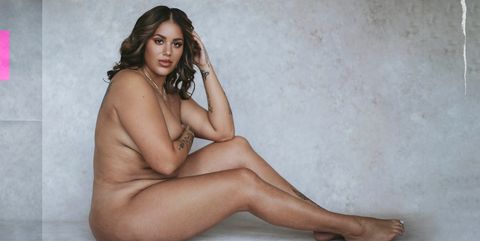
.
Sophie Potter
Sophie, 32, from Hull, has Down’s syndrome and is a Myth Buster for learning disability charity Mencap. She hates it when people call her cute. She’s a woman, not a child. And she never compares herself – or her body, for that matter – to other people.
Dancing in my underwear, having my photo taken for this feature, I felt confident. I felt stylish. I don’t like it when people call me pretty. I’d rather be beautiful or gorgeous. I want to be seen as sexy, too. Definitely sexy, but don’t call me cute. Never cute. It’s babyish. And I’m not a child. I’m a 32-year-old woman – and that’s what I want people to see in this photo. People always think I’m a lot younger than I actually am.
When I look in the mirror, I say nice things to myself out loud. Maybe I look classy in what I’m wearing. So I say, ‘Oh darling, you look gorgeous!’ I like what I see when I look in the mirror. And I never, ever get jealous of other people. Someone else can be beautiful, but I don’t want to be like them. I want to be me. Why would I want to be anyone else? But personality is always more important than looks. Well, it should be. Sense of humour is important – I love people who can make me laugh.
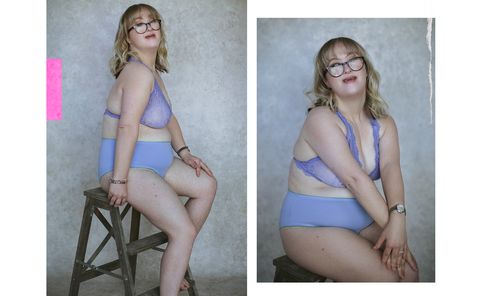
.
My grandma Olive passed lots of things down to me. She taught me to always carry perfume in my handbag. When I started my period, she gave me a little bag to carry my pads in and said that I should always keep them with me, just in case. She taught me how to look after my skin. I put moisturiser on every day. I like having a laugh, so I put music on in the background and dance most mornings.
My favourite part of my body is my shoulders, they get me moving when I dance. I love my hair. I like wearing tights and a short skirt. I love my legs, especially in my Dr. Martens boots. When I go to a disco, I love having some cleavage out, too. I’ve got great boobs. My sister, mum and me giggle about me having the biggest boobs. Sparkles are my fave because I’m a party girl at heart. I love having a drink. I go on nights out with my sister and her mates all the time. I’m always the last one standing. I like a lager and lime, that’s my pub drink. Or maybe a G&T. People are surprised when they know that I like a drink. There are loads of things people get wrong about people with Down’s syndrome. I want to show that people like me can go out and dance. I can party as much as anyone else. Once on a night out, this guy was staring at me rudely. I hated it. No one should do that. I’m allowed to be there.

.
I love wearing a swimming costume on the beach – I don’t get shy. I don’t need to cover myself up. I love being naked; I love dancing naked in my bedroom. My family are important to me. Before my mum met my stepdad, I grew up in a house of all women – me, my sister and my mum – so it was quite a naked house. There was no shame. We were open about what our bodies looked like. I love my body. I never wake up hating how I look. No one should.
Sophie’s sister Emily runs creative workshops for people who have learning disabilities @_down.the.lens_
Dee Avorkliyah
Dee, 31, from London, was diagnosed with breast cancer in her twenties and is waiting for breast reconstruction, which has been delayed as a result of the pandemic. She’s now learning that you can’t wait for change in order to accept the skin you’re in.
It was just a normal Sunday afternoon, and I was in the shower. Standing under the water, I moved my fingers over my breasts, pressing them into my skin. I wasn’t paying much attention, but that’s when I felt it – a hard lump the size of a grape hidden in the softness. For a split second, time stopped.
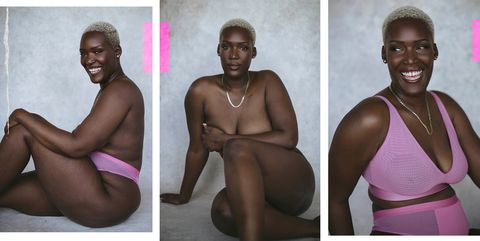
.
Just the day before, a breast cancer awareness programme came on TV. I was 28 at the time and I’d never even thought about checking my breasts. I often wonder what would have happened if I hadn’t stumbled across that programme. I wasn’t frightened though, thinking it was nothing more than a cyst. But I rang 111. From then on, things moved quickly. After meeting with a GP, I was sent to hospital to see a breast cancer specialist for an ultrasound and biopsy.
Two weeks later, I heard three words no one wants to hear. ‘You’ve got cancer.’ I’d been so convinced I didn’t have it, that I couldn’t even process it. The weeks went by in a blur, and within a month I’d started treatment – not before undergoing egg harvesting though, because chemotherapy can cause infertility. I already have a son, but I want more children.
I barely thought about what I looked like, I was just trying to survive. I’d been told I’d need a mastectomy, but because I responded well to treatment, doctors opted for a lumpectomy, which removed the lump in my breast. I loved the way my boobs looked before, but when I peeled away the bandages after the procedure, I was disappointed. My breasts were uneven, with scarring where the lump was removed. I’d also put on a lot of weight due to the steroids I was taking. Whenever I caught a glimpse of my body, I was so overwhelmed by the reminder of what I was up against that I couldn’t look at myself in the mirror – the woman looking back wasn’t Dee.
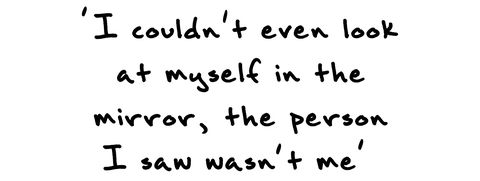
.
I didn’t want to be consumed by the way I looked – after all, I was up against cancer – so I spoke to a surgeon about having reconstructive surgery. I was excited to have the procedure, desperate to rediscover my confidence and have breasts that looked the same size, but due to the pandemic my operation has been pushed back. Now I’m not sure when – or if – it’ll go ahead. Because of that, I’ve had time to reprogramme the way I see myself. If the surgery gets done, it gets done. But if it doesn’t, it’s not the end of the world.
I don’t think it’s realistic to be in love with your appearance all the time, but three years on from my diagnosis, I’m coming to accept that this is my body now. It’s taken some time, but I’m at a point where I’m confident in my own skin and, more importantly, grateful that I’m still here. I’m thankful to my body that’s carried me through this journey, and is still carrying me through.
Hear more stories like Dee’s onMacmillan’s weekly Talking Cancer podcast
Lucy Beall
Lucy, 23, a master’s student living in London, has recessive dystrophic epidermolysis bullosa, a genetic condition that causes skin to become very fragile, resulting in open wounds and constrictive scar tissue.
Lying on a hospital bed, my mum held my hand as the nurses put the anaesthetic mask over my face. I was just 12 years old, yet I could feel the weight of what I – and my body – would have to go through. At the time, the skin on my body (usually covered in painful sores and blisters) was the least of my concerns because a build-up of aggressive scar tissue – a common side effect of my condition – meant that my throat was closing up and I was struggling to swallow. I was terrified, worried that it could close up entirely. Conditions like mine are so apparent on the outside that people often forget the damage that’s being done on the inside.
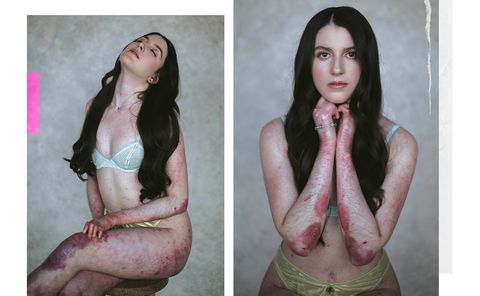
.
I was diagnosed with recessive dystrophic epidermolysis bullosa (RDEB) just after I was born and I grew up with a family who were honest about the implications of having a visible disability. I had a great childhood and I was rarely teased for the way I looked, but that meant I didn’t really understand what was to come when I hit puberty. Being a teenager sucks anyway, but being a teenage girl who looks different poses its own unique set of challenges, especially because RDEB means my appearance can change. Right now, I’ve got about ten open wounds on my body – sometimes they can be as small as a 10p coin, or so large and sore that I can barely function because of the pain – next month, though, I might have fewer. This means the outside world’s perception of me is always changing. One day I look like me, and the next day I could fall and graze the skin on my face, meaning that within 24 hours I can go from being ‘conventionally attractive’ to having people stare and point at me in the street. I’ve noticed I’m treated so much better whenI don’t have wounds on my face, or if I cover up the scars on my body.
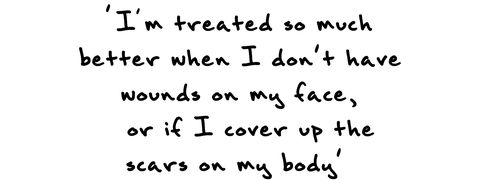
.
I try not to let other people’s views change the way I feel about my body, because if I did, I’d never be happy. But it’s not just everyone else’s opinion I’ve had to work on. I’ve had to challenge my own view, too. There was a time when I’d cry for hours, dreaming of how much kinder society would be without my RDEB. Then, one day, I had the realisation that resenting my body wasn’t going to change it. I’d spent the afternoon sobbing to my mum, asking her why I didn’t look like other girls. ‘You’ll never look like them,’ she said, ‘but you don’t need to look like them to be beautiful.’ From then on, I literally accepted the skin I’m in: I’m disabled. I have RDEB. It can be devastating, but it does not define me. My body may be limited, but my mind never is.
For more information about RDEB, visit debra.org.uk
Caprice-Kwai Ambersley
Caprice-Kwai, 20, from London, has osteoarthritis, a degenerative joint condition that causes pain, swelling and difficulty moving, meaning she relies on a mobility aid – her crutch – on a daily basis.
That day started like all the days before it. Wake up, wash my face, brush my teeth. But that day – one moment, really – changed my life. I was just at home, when I tripped over. An excruciating pain ripped through my leg. Looking down, my kneecap had dislocated. The image is still vivid in my mind.
After that, my leg was strapped up for months. I was waiting to get physiotherapy, but still every day my leg kept feeling stiffer – until eventually I couldn’t bend my knee. I was only 10, yet I’d lost control of my body. To try to regain mobility, I spent weeks at a time hooked up to a machine that kept my leg in motion. When I wasn’t, I relied on a crutch to get around. I resented it. Looking at myself in the mirror with the crutch by my side, I hated it. I hated how the girl I was before the accident was gone.
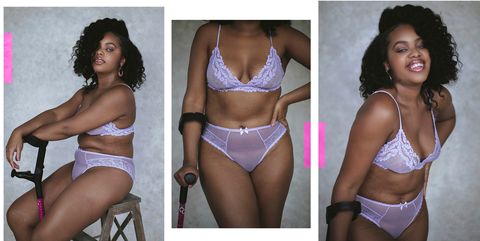
.
The next few years were disrupted by tests, scans and surgeries. I was poked and prodded as doctors tried to work out what was wrong with my leg. Finally, I was diagnosed with osteoarthritis, a condition that causes joints to become painful and stiff. That trip, that seemingly insignificant fall, had been the trigger.
At 12 years old, osteoarthritis wasn’t a condition I knew anything about. That’s just something old people get, right? It’s a stigma I’ve faced every single day since being diagnosed. Strangers come up to me in the street and ask why I’m using a crutch. When I tell them I have arthritis, they don’t believe me. Or worse, they tell me that I’m ‘too young’ so I must be mistaken. Honestly, I really wish I was.
Not only is there a stigma around arthritis, but also when it comes to being disabled at my age. Arthritis is a somewhat invisible condition, so my pain is often minimised by those who don’t understand. People question whether I’m really in as much pain as I say I am, but they don’t realise that I can’t walk long distances, that I haven’t been able to run in a decade, that my pain means I’ve lost the freedom to be the 20-year-old that I am. Whenever I sit in a disabled space on the bus, I can feel the eyes of the other passengers staring. I can hear the questions swirling in their heads. They’re judging me. ‘Why is she sitting there?’ As soon as I stand up and use my crutch, that perspective shifts instantly. I wish people realised that there’s no one-size-fits-all image when it comes to what disability looks like.
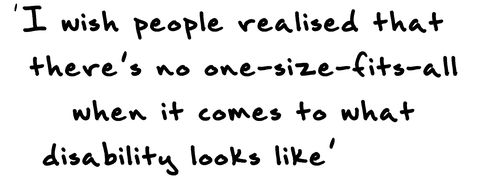
.
Although my disability causes me pain, I’ve learned to accept that this shouldn’t change how I feel about myself. It’s easy to get caught up with comparing my body to others – especially with social media pushing the narrative that we all need to look a certain way. It’s why I’m so passionate about sharing my story – being the role model that I needed when I was a young girl staring at myself in the mirror and hating who I saw looking back at me. I used to be so embarrassed by my crutch, but now I embrace it. I realise that I wouldn’t be the person I am without it.
Eden-James Vickerman
Eden-James, 26, from Manchester, has had three lots of gender-affirming surgery over three years, helping her to understand herself so much more.
Long blonde waves were flowing down my back. The feeling of hair tickling my exposed shoulders was a new sensation and I relished it, enjoying how my cheeks looked contoured and shimmery, my eyelids slicked with shades of creamy brown. I was looking at the female version of myself for the very first time. I smoothed down my tiny black dress, taking in every inch. I knew then what I needed to do and who I needed to be.
I grew up in Preston, a northern city with no queer scene and no space to explore my feelings about femininity. When I moved to London to study fashion at 18, I was surrounded by gay guys but still I couldn’t relate. I started to question, ‘Am I trans? A drag queen?’ I now know they aren’t the same, but at the time, I didn’t. For the past five years I’d been questioning everything about my gender. Then, aged 23, I went out with a friend who’s trans, dressed in a black dress, heels and wig. We picked a weeknight in the Gay Village, an area in Manchester, so it’d be quiet. I didn’t want to standout in case I felt awkward. I just wanted to see how I felt. It came as a shock how much clicked into place that night. It’s not that I’d felt uncomfortable presenting as male, but I wasn’t fully living life. I’d finally figured out what being trans could mean. There’s a narrative about trans people feeling like we’re born in the ‘wrong’ body. But for me, I’ve always felt this is my body, I’ve never had another one. I don’t know what that would even feel like.
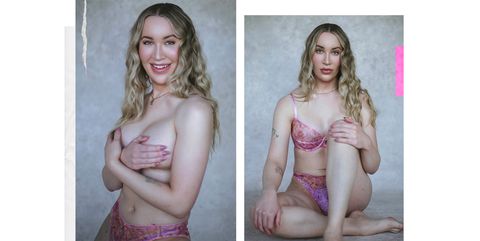
.
That moment set in motion the next part of my journey. I started taking hormones on 30 September 2019, at the age of 24. Mentally, I felt the effects almost instantly – the typical characteristics of oestrogen: more emotional, mood swings. But at the same time, I felt more balanced. To look at, I wasn’t female or femme-presenting, so I still wasn’t being seen how I felt. But I knew I was doing what I needed to do for me.
In the following year, I had facial feminisation surgery. Before it, my face was very masculine. The year after it, my face changed so much. People started addressing me as ‘miss’. Three weeks before this shoot, I had my first body surgery: breast augmentations and liposuction. You can see some of the fresh scars in the photos. I had fat taken from my flanks, my stomach and inside my thighs, then my surgeon transferred that into my hips to make me look more curvy.
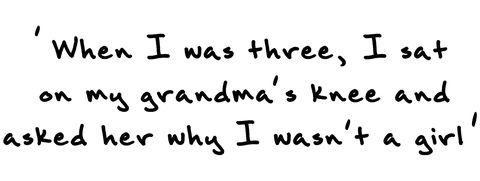
.
After that night in Manchester, I wrote a letter to my parents – nine sides of A4 paper, telling them how I felt. When I gave it to them, they said they’d always known. When I was three, I sat on my grandma’s knee and asked her why I wasn’t a girl. I didn’t remember, but my parents did. It’s always been there, this feeling.
I’m trans, I’m not afraid of that any more. I’m not embarrassed when people can tell. I can’t change my height, my shoe size or how deep my voice is. Yeah, I’ve had surgery and take hormones, which has changed things. But I’m still me. This is who I am, it’s a moment in time. My body transitions with me.
